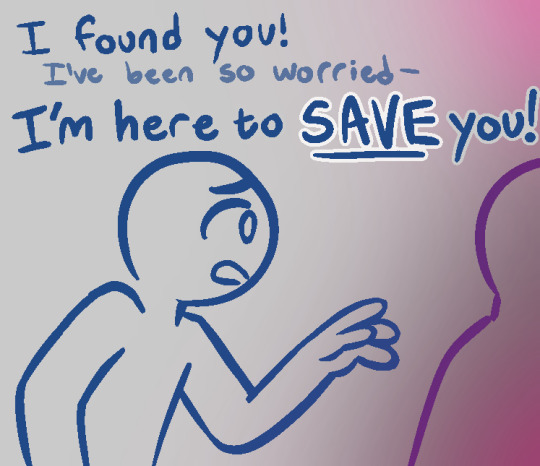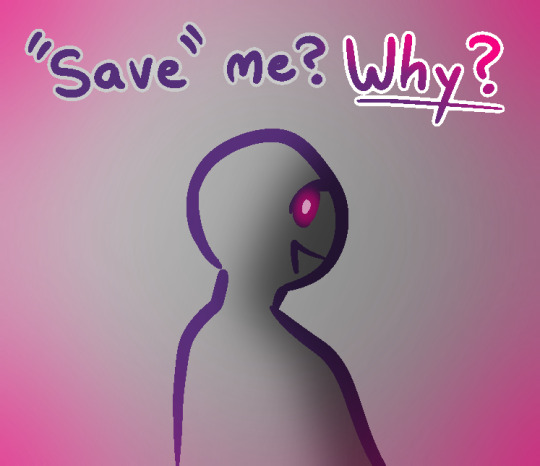Madd - They/Them - 23I've got a Creative License and I'm not afraid to use itEXCLUSIONISTS/TRANSPHOBES NOT WELCOME ❤️
Don't wanna be here? Send us removal request.
Text
Neurodivergent assassin who very casually uses their weapons as stim.
Turning on and off the safety of their gun. Tapping and spinning their dagger. Watching the poison in the vial move as they flip in and then back.
Nobody says anything because...well they're an assassin.
Turns on safety, presses trigger, turns off safety repeat.
People around them are in constant fear.
Chewing the end of their poison tipped dagger when they try to figure out a plan.
Wash their hands too much cause they don't like how sticky blood is.
However overtime it becomes a weird single to others.
Everyone is anxious trying to figure something out and they hear a little "click click" and it's just slightly calming to know that they have this person there and they are thinking of a plan.
Someone hands them a drink but it flows just a little too weird and they are like, "hmm that's poison" then chuck it because they have built up immunity.
No table that doesn't have something carved into it.
Never a situation where they don't have enough bullets because this person takes out the cartridge and puts it back as stim.
They take apart their guns and put them back over time being crazy fast and efficient with it.
Just give me a neurodivergent assassin/spy.
4K notes
·
View notes
Text
Things almost every author needs to research
How bodies decompose
Wilderness survival skills
Mob mentality
Other cultures
What it takes for a human to die in a given situation
Common tropes in your genre
Average weather for your setting
496K notes
·
View notes
Text
what's that one thing where they asked how ripely from alien was so realistic and believable as a female character in scifi for once and they were like "well we just took the dude from the original script and made him a girl and changed nothing else. it works bc men and women are the same?" and people were like "woah no way" and then didn't learn anything from that for 20 years
98K notes
·
View notes
Text
PSA: Writing a book can take a looooong time. If you've been working on your project for a year, two years, five years... you're not doing anything wrong. If you've written three drafts and thrown them all away, if you can only write a hundred words a day, if you put your book down for six months and pick it up again only to be baffled by what you've written... Congratulations. You're not inefficient or slow. You're just a writer. Welcome to the writing life.
5K notes
·
View notes
Text
people talking about “forced diversity” like characters being PoC or LGBT or disabled “for no reason” like
are people in real life PoC or LGBT or disabled for a reason
do these critics run up to people on the street like WHY ARE YOU BLACK
289K notes
·
View notes
Note
What exactly defines a token character as a bad representation choice and not as a "background character" who happens to be disabled? And can a disabled character be the only disabled character but still good representation?
I know having relevant disabled characters is important, but when, besides the cast members who influence the plot, you have one of those scenes where a one-off character needs to be there, like when the autistic protagonist needs a ride in the middle of the road and a little person stops to help, or when the wheelchair user main character wants to talk to the magic council about a certain situation and the attendant is a blind person with a cane who checks the information of a braille book, is it safe from tokenism?
Hey!
For this post I will use "representation" to imply good/decent representation, not just the act of XYZ minority technically appearing on the page.
There's definitely a lot to discuss when it comes to tokenism, and there are a lot of different criteria that you can use to define what exactly it is.
So I'm gonna start with the main definition of what would differentiate a "token" from an unimportant character (=one that doesn't influence the actual plot) who just happens to be disabled: how you go about the fact that they are in your book(/comic/etc.).
If you put in the description of your work that it's "disability rep!" because there's this one guy in a wheelchair in one scene, that's tokenism: using a minority to simply boost/promote something as "diverse". That's the most annoying occurrence of it, there's so much media that people recommend as "XYZ rep" and when you look into it, the "rep" is a side character that shows up in two episodes and has like a line of dialogue. Sad!
To use one of your examples, tokenism would be if you claimed that your work has "dwarfism representation" in it because of that one guy who helps the main character in one scene. It's... just not that. That doesn't mean it's bad; if every single background character who wasn't a cisHet white abled Christian man (etc.) was supposed to be deep and thought-provoking then no one would be writing them, because that's not what a background character is supposed to be.
But - you could commit a tokenism with a character even if they are just a background extra who shows up once. Tokenism often goes with the fact that the token character could be swapped out for a non-minority one and nothing would change, since the key here is that the author doesn't really care: it's all just to say "hey, I got XYZ in my book!". So if you were to write a background character that you explicitly mention has disability X, but then they do something that a person with that disability wouldn't be able to do - that's probably a token (if not, it's still a badly made character). It's there to "represent" a group, but it doesn't make sense and there is no point so to speak because the author just doesn't care.
In that way, many disabled characters are just tokens - because the writer is writing an abled character, but keeps calling them disabled. When's the last time anyone has seen a character with albinism who was blind or low vision? What's up with all those deaf characters who read lips and speak orally so well that you literally forget they are even supposed to be deaf? Why is that "tragically unable to walk" character... walking for the entire duration of the book? They're just tokens done with no care nor research, it's all diversity points and quirky aesthetics. Everyone wants to be "inclusive", no one wants to actually have a disabled character who experiences disability.
Another thing with background characters is what role they serve. Most of them are fine - cashier has a skin condition, guy ordering a drink uses a speech generating device, mom of an annoying kid doesn't have a leg, cool. But sometimes it's worth to just ask "why am I making this specific character, whose disability has no impact on the story, disabled?". That is to say that if you need a prodigy piano player and your idea is to make them totally blind who always wears sunglasses, or to make the generic murderer have a big burn scar on half of their face, you're repeating a stereotype. "Role" also encompasses what happens to them. Does the one disabled guy just... die, and that's all? That's a token.
Those are the main things I'd avoid when it comes to background characters. Don't claim that they are what they aren't or represent what they don't, and if you want a disabled character - even just an extra - then either commit or just don't do it, and keep in mind where you're putting them in the first place.
Can a disabled character be the only disabled character but still good representation?
They sure can, but they just aren't, usually at least. The problem with single character representation is that it puts a big burden on this one character: to represent a whole community. That's a lot. I've found myself in this exact spot before: small cast, one character is disabled, and I try to make the whole thing better and more authentic... every single time the result was adding more disabled characters, even if their roles were smaller. It's about the potential contrast.
There are choices that you can do when you have multiple characters of X minority that you should probably avoid if there's just one of them. If I see a work that has three blind characters and one of them wears sunglasses, my reaction will be "oh, cool, they have photophobia like me". If there's one blind character, and they wear sunglasses, my assumption will be that that's what just the writer thinks all blind people wear.
(Even though, that singular character could 100% also be photophobic. My assumption here is based on my experience, because that's how it usually goes.)
In that case you can find yourself in a place where you either need to subvert a bunch of stereotypes (some of which are based in fact!) or address it in one way or another in your work. That character could say "oh, I wear sunglasses indoors because even artificial light really hurts my eyes", but in order to do that, you need to be aware that this is a writing trope in the first place. Not to mention, if you do it too much, it starts reading as some sort of disability PSA. There's a fine line to everything, and the fewer characters of a particular minority you have, the harder it is to navigate it in a way that feels natural to actually read.
Sometimes the occurrence of just a single disabled character also raises some questions. Where's everybody else at? There are some exceptions to that (e.g. stories with a very limited character count) but generally speaking, everyone knows someone who's disabled in one way or another, especially if they're disabled themself. Books tend to make disabled people seem as a rare phenomenon, but that's really not the case.
Sometimes it borders on nonsensical worldbuilding - all those disabled characters who only get their mobility aids/meds because they Know A Guy (or are that guy)... I always ask myself, "what about all those people who don't know this one specific guy? what about everyone who lived before and after this one specific guy?", and I don't think the authors ever consider that. Unless the world population count is in triple digits at most, your character won't be the only disabled person. Writing in a way that subconsciously implies that they are is to me just another form of tokenism, because they're not only the only disabled character in the story, they're also presumably the only one in that universe overall.
This is just a lot of paragraphs to say that you probably aren't ever fully safe from tokenism unless there are multiple disabled characters who have at least somewhat important roles in the story - and even then, they can still be badly written, just in different ways.
Sorry for the long post but I hope this helps,
mod Sasza
138 notes
·
View notes
Text
This feels like a good time to post a reminder about the NaNo-inspired spreadsheet I made, based on the old website:
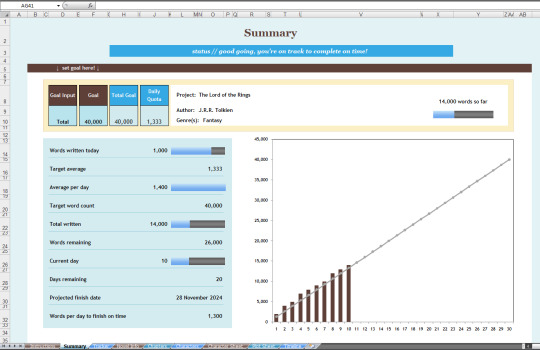
It's available here for download - free if you want, any support is appreciated because it means I can keep making trackers and helps with my website costs, but I know times are tough for a lot of us. I've also put it up on Google Sheets here, but it looks a little different because the fancier chart effects aren't supported. You'll have to download it or make a copy to be able to use it. (Please don't ask me for edit access, that won't work. File > Make a copy, and you'll have it on your own Google Drive.)
I also made this in four other designs, available here. They all come with character and plot development sheets, and pages for novel info, chapters, timeline, etc. And there are versions for every month, so we're not confined to November!


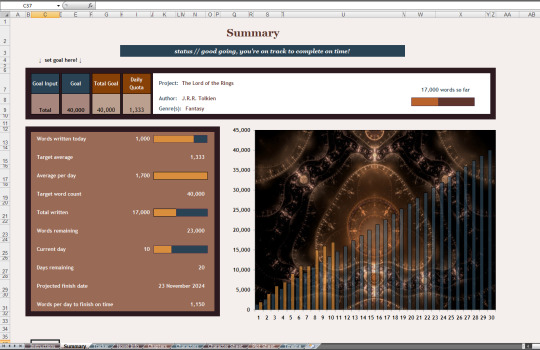
And finally, because I always loved seeing everyone's word counts and accountability really helps me personally, I made a basic spreadsheet that you can use as a group to collectively track word counts or goals. This version's made for up to 8 people. Again you'll have to make a copy in your Drive to use it, and you'll need to give edit access to your whole group as well.
If there's interest, I'll keep making these as well for each new month. I can also expand it or add more columns/features, so feel free to let me know if you're interested and what you'd like to see!
1K notes
·
View notes
Text
Tips for writing flawed but lovable characters.
Flawed characters are the ones we root for, cry over, and remember long after the story ends. But creating a character who’s both imperfect and likable can feel like a tightrope walk.
1. Flaws That Stem From Their Strengths
When a character’s greatest strength is also their Achilles' heel, it creates depth.
Strength: Fiercely loyal.
Flaw: Blind to betrayal or willing to go to dangerous extremes for loved ones.
“She’d burn the whole world down to save her sister—even if it killed her.”
2. Let Their Flaws Cause Problems
Flaws should have consequences—messy, believable ones.
Flaw: Impatience.
Result: They rush into action, ruining carefully laid plans.
“I thought I could handle it myself,” he muttered, staring at the smoking wreckage. “Guess not.”
3. Show Self-Awareness—or Lack Thereof
Characters who know they’re flawed (but struggle to change) are relatable. Characters who don’t realize their flaws can create dramatic tension.
A self-aware flaw: “I know I talk too much. It’s just… silence makes me feel like I’m disappearing.” A blind spot: “What do you mean I always have to be right? I’m just better at solving problems than most people!”
4. Give Them Redeeming Traits
A mix of good and bad keeps characters balanced.
Flaw: They’re manipulative.
Redeeming Trait: They use it to protect vulnerable people.
“Yes, I lied to get him to trust me. But he would’ve died otherwise.”
Readers are more forgiving of flaws when they see the bigger picture.
5. Let Them Grow—But Slowly
Instant redemption feels cheap. Characters should stumble, fail, and backslide before they change.
Early in the story: “I don’t need anyone. I’ve got this.”
Midpoint: “Okay, fine. Maybe I could use some help. But don’t get used to it.”
End: “Thank you. For everything.”
The gradual arc makes their growth feel earned.
6. Make Them Relatable, Not Perfect
Readers connect with characters who feel human—messy emotions, bad decisions, and all.
A bad decision: Skipping their best friend’s wedding because they’re jealous of their happiness.
A messy emotion: Feeling guilty afterward but doubling down to justify their actions.
A vulnerable moment: Finally apologizing, unsure if they’ll be forgiven.
7. Use Humor as a Balancing Act
Humor softens even the most prickly characters.
Flaw: Cynicism.
Humorous side: Making snarky, self-deprecating remarks that reveal their softer side.
“Love? No thanks. I’m allergic to heartbreak—and flowers.”
8. Avoid Overdoing the Flaws
Too many flaws can make a character feel unlikable or overburdened.
Instead of: A character who’s selfish, cruel, cowardly, and rude.
Try: A character who’s selfish but occasionally shows surprising generosity.
“Don’t tell anyone I helped you. I have a reputation to maintain.”
9. Let Them Be Vulnerable
Vulnerability adds layers and makes flaws understandable.
Flaw: They’re cold and distant.
Vulnerability: They’ve been hurt before and are terrified of getting close to anyone again.
“It’s easier this way. If I don’t care about you, then you can’t leave me.”
10. Make Their Flaws Integral to the Plot
When flaws directly impact the story, they feel purposeful rather than tacked on.
Flaw: Their arrogance alienates the people they need.
Plot Impact: When their plan fails, they’re left scrambling because no one will help them.
Flawed but lovable characters are the backbone of compelling stories. They remind us that imperfection is human—and that growth is possible.
9K notes
·
View notes
Text
the ‘kind character snapping’ trope has been co-opted by too many people who don’t understand it fundamentally. you can’t have your character actively think of themselves as that kind of person bc that makes it like bragging. ‘you wouldn’t like me when i’m angry 😡’ ’no more mister nice guy 😈’ ’demons run when a good man goes to war 👿’ ’honestly i scare myself sometimes 😰’ WROOOOOONG. those are all threats. first off a truly kind character should be humble and not even consider kindness a thing of theirs. and second off please. if they’re truly gentle they should be ashamed of the very thought of their own wrath and not like openly talk about it. yeah i bet they do scare themselves and others when they finally get pushed too far but like don’t have them say or consciously think that without shame… it should be like a tragic thing that happens to them against their will and not like an alter ego they’ve been gleefully looking for an excuse to slip into
3K notes
·
View notes
Text
your dark fantasy novel doesn't need a logic-based magic system it needs a bear with a human face
20K notes
·
View notes
Text
i wish i could remember who made the recommendation to "make a list of all the different ways someone could feel about a topic in your fictional setting and then make each of them a character" because it is a great technique and is also extremely fun
5K notes
·
View notes
Text
what they don’t tell you about writing is AAAAAAAAAAAAAAAAHHHHH!!!!! AAAAAAAAAAAAAAAAAAAAAAAAAAAAAAAAAAAAAAAHHHHH!!!! AAAAAAAAAAHH!!!
28K notes
·
View notes
Text
“This reads like fanfiction (it feels like it was written by a preteen, and most of such things posted publicly are fanfic)” vs “This reads like fanfiction (it has a focus on character and relationships, like the style of a lot of modern fanfic)” vs “This reads like fanfiction (it keeps referencing people and events with the assumption that the audience is already familiar with them, like how fanfic doesn’t need to rehash the source material)”
50K notes
·
View notes
Text
You should start headcanoning characters as intersex
3K notes
·
View notes
Text
If you're a writer you're supposed to write a lot of bullshit. It's part of the gig. You have to write a lot of absolute garbage in order to get to the good bits. Every once in a while you'll be like "Oh, I wish I hadn't wasted all that time writing bullshit," but that's dumb. That's exactly the same as an Olympic runner being like "Oh, I wish I hadn't wasted all that time running all those practice laps"
*edit*
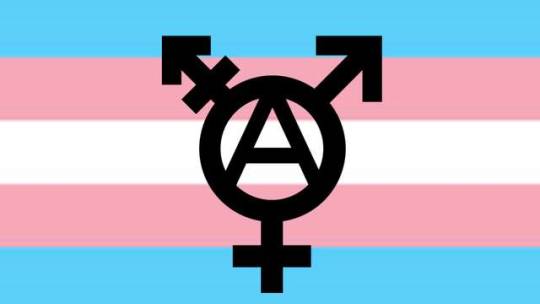
54K notes
·
View notes

